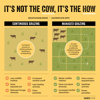Agriculture in our local area
One of our local young supporters with a passion for agriculture wrote this interesting article about the farming industry.

In this article, I explore some of the questions and answers surrounding farming’s potential role in community sustainability and how this fits in with wider environmental initiatives and demands. I do so off the back of speaking with Colin – a farmer in Eridge who is looking to (re)introduce some regenerative farming approaches for the betterment of the
environment and also people’s health.
The discourse around saving our planet can often be hard to decipher, with threats to our environment coming in many different, often overlapping, forms, which also come with their own initiatives, guidelines and roadmaps. At the forefront of many of these challenges is
farmers, who, as custodians of our natural spaces, work tirelessly to preserve our countryside for generations to come. Despite focusing increasingly on the environment in public perceptions, people often don’t stop to think how some of their consumption choices can fuel either environmental restoration or degradation…
So what is the answer? Well, in short, I don’t know, but I recently spoke with Colin – a farmer in Eridge, who has some ideas on how farming and the consumption and light processing of its products at the local level can yield great results for our planet and our health.

UK farmers are increasingly under scrutiny due to their industry’s environmental impact, particularly concerning soil degradation, water pollution, and potential emissions. Agriculture contributes significantly to nitrogen and phosphorus pollution, impacting water quality in
rivers and lakes. With rising demands for sustainable practices, farmers face pressure from regulators, environmental groups, and consumers to adopt practices that protect biodiversity, conserve resources, and reduce emissions. Meeting these standards is critical for ensuring the long-term viability of UK agriculture. However, by moving away from harmful fertilisers, over-modified plant varieties, and overgrazing, many farmers are cultivating a way forward for British farming – something of tantamount importance for the ‘Garden of England’.
However, the benefits are not just for the planet but they are for people also. Colin spoke to me about the ways in which crop choices can impact people’s health. This is particularly salient with heritage grains, which are traditional cereal varieties that have been preserved or revived without extensive genetic modification, prised for their diverse flavours and potential nutritional benefits compared to modern high-yield crops. Heritage grains also make flour-based products that are less problematic for people with gluten intolerances. Additionally, the diverse planting of heritage grains can reduce the need for potentially harmful agrichemicals, which promotes biodiversity, soil health, and more nutrient-rich food.

Another technique Colin talked about implementing was Mob Grazing for cattle rearing, which involves large herds grazing in sectioned paddocks for short periods (see image, below). This opposes conventional methods like set stock grazing, which can fail to stimulate growth in underproducing pasturelands as livestock are kept on one large plot. The idea of using Mob Grazing emulates natural grazing patterns, which ensures consistent grass uptake and manure distribution. Mob grazing does take meticulous planning as having high volumes of livestock in one area can damage soils through compaction, but if planned correctly, the influx in grazing population can help jump-start soil regeneration, which will occur over an 80–120-day rest period. This optimises soil health, which produces nutrient-dense food and doesn’t rely on external input materials.

As is the case with many environmental measures and approaches, there is no ‘one way’ of doing things. However, these practices reduce the dependence farming has on fertilisers and enable farmers to produce quality food sustainably. Ultimately, every farmer I have spoken
with sees themselves as a custodian of the land, and they, therefore, want to use it responsibly. This is not a one-sided discussion though, as farmers must receive proper investment and encouragement from grants and community action. Whilst Colin feels there is interest in retailing these products from local businesses, there is currently not enough demand from consumers or that this demand is not being adequately facilitated by localised food networks. There are campaigns like Food for Change, looking to connect consumers/retailers with small producers but more definitely needs to be done to bridge this gap. He also suggested that more localised food systems would ensure people were able to source healthy and affordable food, as the corporations processing, and thus profiting off, this product were out of the supply chain.
There is so much scope for local organisations and individuals to make lasting changes to our community and planet’s health through these emerging food systems. Colin himself putting it best, saying:
“People are waking up to the fact that their health is not separate to the health of the land. You can’t do better than support your local producer! Good old fashioned self-sufficient community!”
Related stories



